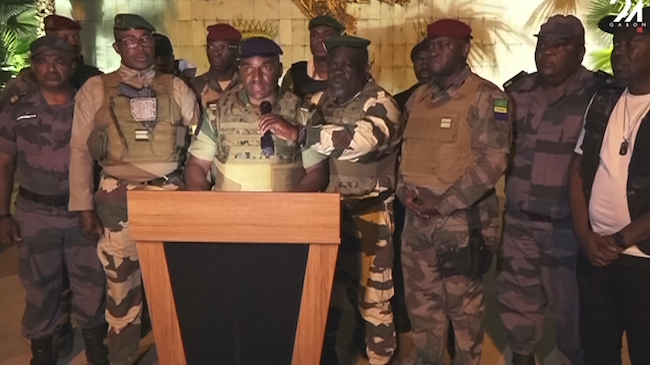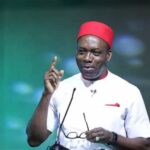By Olasupo Abideen
Just as stakeholders are trying to navigate how to find resolution to the ongoing political saga in Niger Republic, the most recent report has it that army officers appeared on national television in Gabon to say they have taken power. They said they were annulling the results of Saturday’s election, in which President Ali Bongo was declared the winner. This makes it the sixth African country sliding into undemocratic interventions leading to palpable levels of apprehension amongst African countries and indeed Nigerians and especially northern states sharing boundaries with Niger Republic. This is due to a potentially critical role Nigeria and especially its leadership could play in either escalating or resolving the situation. Thus, it is imperative to unequivocally state that Nigeria as a country is not planning to go into war with its neighbor or any other country for that matter.
Beyond that, the bilateral relationship between Nigeria and Niger goes beyond mere geographic neighbors. Both nations share incredible cultural traits especially with the northern part of Nigeria in the areas of language and religion due to what can be described as interlocking bounds shared. Its political rapport is so strong that in 2019 political elites in Niger republic reportedly visited Kano, Nigeria to campaign for the then All Progressive Congress Presidential Candidate, former President Muhammadu Buhari (Buhari is touted to have ties with Niger republic). Also, the ongoing rail project from Kano to Maradi in Niger further demonstrates the economic relationship between both countries. Nigeria and indeed Africa will however be making a huge mistake to trivialize the potential eco-political and diplomatic impact of what is gradually becoming a dangerous precedent in parts of West Africa.
While attention seems to be focused on the “rave” of the moment; Gabon and Niger, it is vital to dig deeper in a bid to understand the immediate cause of the trend of unconstitutional takeover in Africa. Curiously, reports also reveal that citizens of affected countries like Mali, Burkina Faso amongst others seem to welcome these military takeovers with jubilations. This actually raises more questions about the quality of democratic governance delivered to the people.
Beyond the fact that there has been consistent discontent that democratically elected leaders in Africa are culpable of corruption, electoral malpractice highhandedness and desperation to cling on to power, political researchers have evidence to believe that the poor response to economic recession caused by COVID-19 led to even more hardship. It is even more striking that all but one coup worldwide since the onset of the global COVID-19 pandemic has been in Africa.
There are also questions around the role of influential countries like Nigeria in the African region and how it may have contributed to economic instability thereby leading to more hardship especially in the case of Niger. For instance, on May 29th, 2023, Nigeria removed subsidies on its Premium Motor Spirit which led to hike in prices not just in Nigeria but its neighboring countries like Niger Republic, Cameroon and Benin Republic. This coupled with dwindling economic fortunes of African countries is leaving the opportunist military juntas to exploit the situations.
There are also concerns of international dimension to the Niger situation with a report revealing that demonstrations in support of Niger’s coup, showed people waving Russian flags chanting “Long live Putin,”. Although no credible source has linked Russia to the coup in Nigeria, its strong connection with interventions in African countries Central African Republic, Sudan, Mali and Libya through the notorious paramilitary Wagner group leaves more unanswered questions.
With the French military maintaining two permanent bases in the Sahel region including Niamey and United States interest in entrenching democracy not a secret, the coups in not just Niger but other parts of Africa may be unfolding within the context of a wider struggle between the West and Russia for influence in Africa. Thus, the potential support by some international powers may have emboldened countries Mali and Burkina Faso to warn about a potential catastrophic impact of any form of violent interventions. This is more reason why the situation must not be allowed to escalate.
Thus, despite indicating existence of standby forces, the Economic Community of West African States (ECOWAS), the African Union and other regional players must extensively explore the paths of dialogue to return the nation back to its most preferred and duly elected democratic government. It is no more news that these coups directly violate the Supplementary Protocol on Democracy and Good Governance; a common and universal norm on democratic governance expected of member states through “constitutional convergence”.
No doubt several attempts are being explored to identify and implement a violent-free solution to the situation in Niger, it will take a lot more commitment and political will from all parties to reach a solution that is favourable to all Nigeriens and indeed the African subregion. The efforts of traditional, religious and revered statesmen in the region are no doubt commendable and has contributed to the mileage achieved in a bid to bring the nation back to normalcy. While the coup leader, Abdourahmane Tchiani has insisted that a transition of power will not go beyond three years, efforts must be intensified to ensure a quicker return to democracy in concomitance with commitment to deliver good governance.
The complication and intricacies that are required to resolve situations has increasingly revealed the need to prevent democratic excesses from escalating to the unwilling situation of unconstitutional transition. ECOWAS must begin by clamping down on West African leaders who are in the habit of violating the constitutional term limits in their respective countries or emerged from a flawed electoral process that fails the minimal standards for a credible electoral process. This will go a long way in limiting discontent that usually leads to these coups. The Community must also move beyond rhetoric and develop practical treaties and charters that will enable leaders of member countries to be not just accountable to ECOWAS but also accountable to the people who voted them into office.
Finally, we must ask ourselves as Nigerians and especially our political elites; what are we learning from these unfolding situations? An in-depth analogy obviously reveals that political elites must eschew any trait that must have ignited unconstitutional transition in our neighboring countries. The role of citizens and Civil Society groups is also critical, especially in putting the government of the day on their feet while demanding accountability at different points in time. It is thus important that active citizenship goes beyond casting votes for candidates to demanding leaders to fulfil their promises. The situation ought not to become a helpless one as the citizens remain at the receiving end of virtually every situation that the country finds itself in.
Olasupo Abideen is a good governance, youth investment, and public policy enthusiast. Abideen serves as the Kwara State coordinator of the NotTooYoungToRun movement and Global Director, Brain Builders Youth Development Initiative.
Please send comments and feedback to abideenolasupo@gmail.com
He tweets @opegoogle

 Join Daily Trust WhatsApp Community For Quick Access To News and Happenings Around You.
Join Daily Trust WhatsApp Community For Quick Access To News and Happenings Around You.


